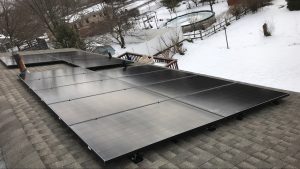Are you thinking about switching to renewable energy for your home? These videos show exactly why you should switch to solar energy
The world recognizes the many benefits of solar energy. In addition to cost savings, solar energy is renewable and has a positive impact on the environment.
For these reasons, home and business owners alike are converting to solar at a rapid pace. The United States recently surpassed 2 million solar installations. At the current pace, nearly 3% of the United States homes will have solar panels.
If you are on the fence about switching to solar, watch these informative videos to help you decide. Explore our YouTube video series answering all of your questions on residential and commercial solar power.
How Do Solar Panels Work? Best Explanation Ever…
Solar panels are installed on the top of your home. They collect sunlight and generate DC electricity.
The solar panel company also installs a power inverter on the side of your home. This device takes the DC electricity generated by your solar panels and converts it to AC power.
This is the power type that you need to operate your home. We recommend watching our YouTube videos for some great visuals on how solar panels work.
What Is a Solar Energy Offset?
Before panels are installed, a solar power company requests copies of your electric bill. The reason is to make sure that the system is consistent with your historic usage of electricity. The solar company will review your kilowatt per hour (kWh) usage over a 12-month period.
Your monthly average is the denominator in a solar power offset calculation. The numerator is the amount of power that your solar power system can produce each month.
For example, say your family uses an average of 12,000 kilowatts (kWh) of power each year. Based on the roof size and sun exposure, the installed solar panels generate 11,000 kilowatts (kWh) per month. The equation is 11,000 divided into 12,000, meaning the solar offset is 92%.
In layman’s terms, this means that a solar power system can meet 92% of your home’s electricity needs. The utility company provides the remainder of the power. You still receive a bill from the utility company each month, at a fraction of the cost.
Even if the solar power system generates more power than your home uses, you will still be connected to the utility company. Instead of a traditional meter, something called a bi-directional meter is installed.
Here, any excess power collected by your solar panels is pushed through the bi-directional meter and back to the utility company. This excess power is stored like a bank credit of electric power.
When your panels are not collecting solar energy due to overcast conditions or at night time, the system taps into this excess power. The topic of solar power offset is another one covered by True Home’s solar video series on YouTube.
Why Is My Electric Bill So High?
You may be wondering why your electric bill is so high. This is especially true in the summer months. In the summer, your air conditioner is working double time. Many families are using electricity to run the swimming pool filter and heater.
While electric bills are slightly cheaper in the winter, there are surges during this time period as well. Many homes see high bills when they run electric heaters or have extravagant Christmas decorations. The Why Is My Electric Bill So High? is getting a lot of natural views and it’s a real eye-opener.
What Are the Benefits of Solar Power?
Besides monthly utility savings, there are other benefits to investing in solar. You are now using a renewable energy source that leaves a positive impact on the environment.
Solar panels on a residence or commercial building do not emit any greenhouse gases. Therefore, you are reducing your home’s carbon footprint and combating climate change. Solar also has a positive impact on your home’s resale value.
How Much Do Solar Panels Cost?
The cost of converting to solar power depends on a number of different variables. For example, the size of your home and its power needs are a major consideration. This is why the solar panel company requests a copy of your electric bill.
The size and condition of your roof also play a part in the cost estimate. Larger roofs can accommodate more solar panels.
The solar company is going to assess the condition of your roof to see if it can support panels and mounting hardware. It is unwise to install solar panels on a deteriorating roof. It is certain to add cost later on as laborers uninstall and reinstall solar panels after repairing or replacing your roof.
There are federal and state tax incentives to help you afford solar power. Each state has different incentives to encourage homeowners to convert to solar power.
It is important to understand that solar conversion has a positive return on investment. The monthly savings on your electric bill eventually overtake the upfront investment costs. Experts estimate that the average homeowner recoups their investment costs within 15 years.
How Do People Afford Converting to Solar?
Very few people have cash lying around to convert to solar. There are a number of ways to pay for solar panels and installation.
Solar companies offer both financing and leasing options for their customers. Homeowners that opt to finance will own their solar panels. On the other hand, leasing is equivalent to a rental agreement and is good for homeowners that need a low monthly payment but don’t necessarily have the tax appetite to capitalize on incentives.
There are traditional ways to pay for solar power conversion. You could take out a personal loan or use home equity.
A Recap of Why You Should Switch to Solar Power
Many people are intimidated by solar power. They know little about it and fear switching to something they do not understand.
The experts will handle the technical side while you reap the benefits. By investing in solar, you will reduce monthly utility bills and make a positive impact on the environment.
If you are interested in switching to solar energy, contact us today to speak with a specialist.



